Economic Cost of Social Media Addiction: Lawyers Perspective
- Last Updated: July 14th, 2025

Attorney Jessie Paluch, founder of TruLaw, has over 25 years of experience as a personal injury and mass tort attorney, and previously worked as an international tax attorney at Deloitte. Jessie collaborates with attorneys nationwide — enabling her to share reliable, up-to-date legal information with our readers.
Legally Reviewed
This article has been written and reviewed for legal accuracy and clarity by the team of writers and legal experts at TruLawsuit Info and is as accurate as possible. This content should not be taken as legal advice from an attorney. If you would like to learn more about our owner and experienced injury lawyer, Jessie Paluch, you can do so here.
Fact-Checked
TruLawsuit Info does everything possible to make sure the information in this article is up to date and accurate. If you need specific legal advice about your case, contact our team by using the chat on the bottom of this page. This article should not be taken as advice from an attorney.
Key Takeaways:
- Social media addiction incurs significant costs to healthcare and workplace productivity.
- Legal and societal challenges add complexity to the economic implications of this addiction.
- Effective strategies are required to mitigate these economic costs while maximizing the positive aspects of social media.
Overview of the Economic Cost of Social Media Addiction
On this page, we’ll discuss the economic cost of social media addiction from a legal perspective, impacts of social media addiction on productivity, legal ramifications for social media giants, and much more.
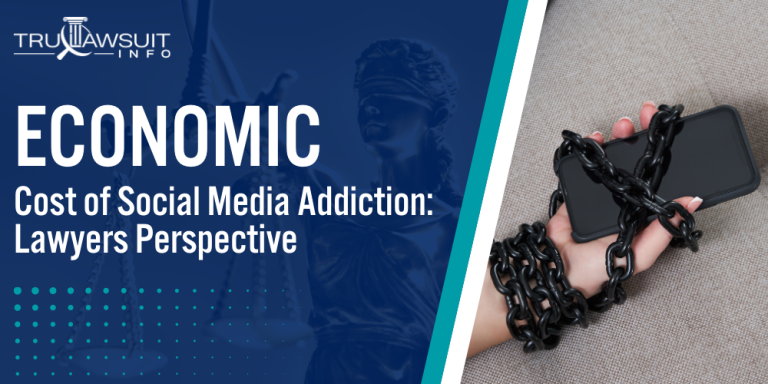
Intro to the Economic Cost of Social Media Addiction
The growing prevalence of social media addiction is not only affecting individuals but also having a significant impact on the economy.
Here are some key ways social media addiction is causing economic costs:
- Decreased Productivity: Employees spend excessive time on social media during work hours, reducing output and efficiency.
- Increased Healthcare Costs: Mental health issues associated with social media addiction, such as depression and anxiety, can lead to higher healthcare expenses for employers.
- Legal Liabilities: Companies may face legal issues if they fail to address social media addiction among employees, especially if it leads to discriminatory behavior or harassment.
- Reputation Damage: Employees’ social media behavior can reflect poorly on the company, potentially damaging its reputation and leading to financial losses.
If you or a loved one is struggling with the economic cost of social media addiction, you may have legal recourse.
Contact TruLawsuit Info using the chat on this page to receive an instant case evaluation and determine if you qualify to file a Social Media Addiction Lawsuit.
Table of Contents
Decreased Productivity in the Workplace
In today’s digital age, social media addiction poses a significant threat to employee performance and workplace productivity.
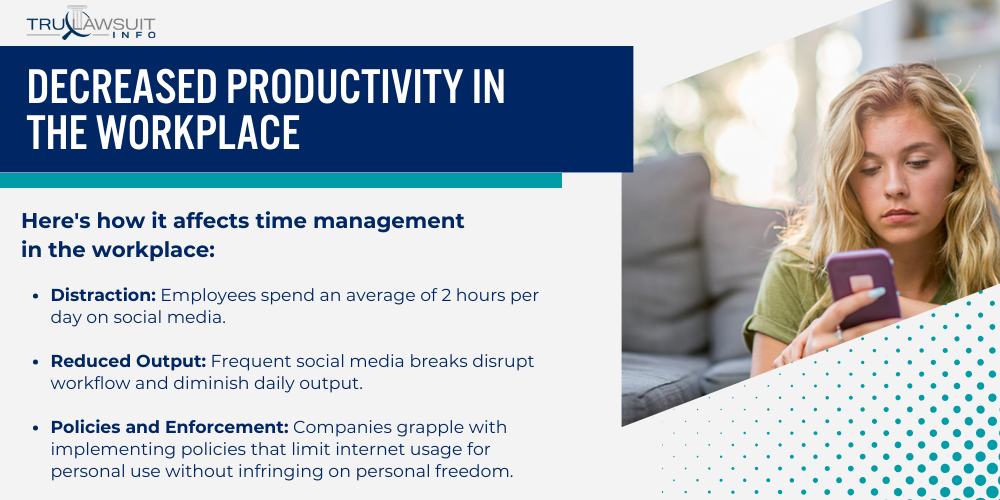
As internet usage rises, so do concerns about its impact on the economy.
Lost Work Hours Due to Social Media Use
Social media platforms are engineered to capture attention, leading to a substantial drain on work hours.
Here’s how it affects time management in the workplace:
- Distraction: Employees spend an average of 2 hours per day on social media.
- Reduced Output: Frequent social media breaks disrupt workflow and diminish daily output.
- Policies and Enforcement: Companies grapple with implementing policies that limit internet usage for personal use without infringing on personal freedom.
- Risk Factors: Certain job roles with less direct supervision are at higher risk for social media misuse during work hours.
The National Institute for Health has flagged addiction to digital platforms as a growing public health concern, impacting not only individuals but also the collective gross domestic product (GDP) due to lost labor.
Impact on Employee Focus and Efficiency
The steady stream of instant messages and emails combined with unrestricted access to social platforms often disrupts employee concentration and reduces workplace productivity.
This digital distraction not only hampers immediate task performance but also impedes long-term professional development.
The influx of notifications and the allure of social media have marked effects on concentration:
- Cognitive Load: Constant switching between work tasks and social media can overwhelm the brain’s ability to focus.
- Quality of Work: The quality declines as the efficiency of task completion is compromised by fragmented attention.
- Learning and Development: Continuous learning and skill improvement suffer, limiting employee growth and work productivity.
- Behavioral Economics: Insights show how addiction to social media can disrupt rational decision-making and efficient behavior in the workplace.
Organizations may need to offer more financial support and resources to address and manage social media use during office hours to safeguard productivity.
Increased Healthcare Costs
The economic impact of social media addiction is multi-faceted, with a notable increase in healthcare costs primarily due to mental and physical health issues.
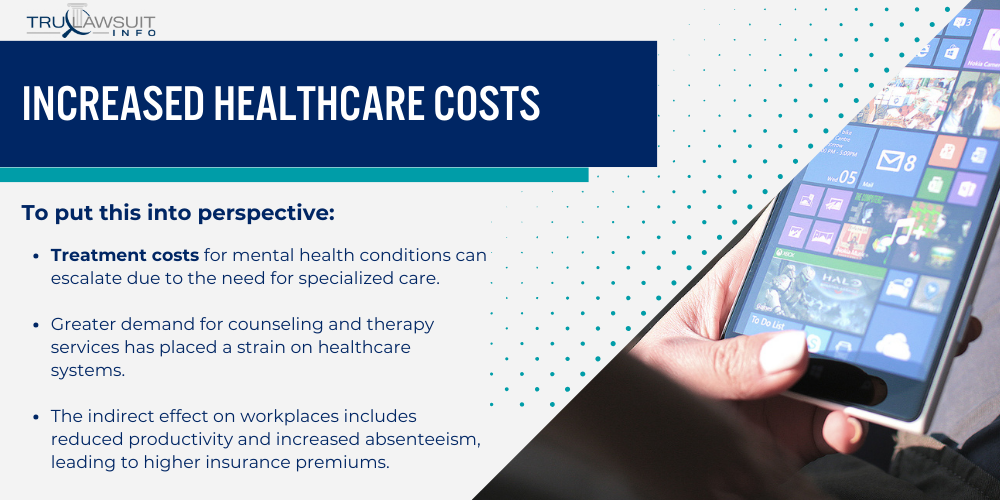
The need for treatment and the consequences of prolonged screen time drives these expenses.
Mental Health Issues Linked to Social Media Addiction
Social media companies may inadvertently contribute to the rising cost of treating mental disorders, particularly among the youth.
Mental health challenges, such as anxiety and depression, have been linked to digital addiction.
To put this into perspective:
- Treatment costs for mental health conditions can escalate due to the need for specialized care.
- Greater demand for counseling and therapy services has placed a strain on healthcare systems.
- The indirect effect on workplaces includes reduced productivity and increased absenteeism, leading to higher insurance premiums.
- Social media addiction has been compared to substance addiction, both demanding long-term treatment strategies.
Physical Health Problems Associated with Excessive Screen Time
Beyond mental health, excessive screen time associated with social media use contributes to a range of physical health problems.
This translates into increased health-related expenditures:
- Issues such as eye strain and carpal tunnel syndrome result in more frequent visits to healthcare providers.
- Sedentary lifestyles linked to long hours of social media browsing can lead to obesity and cardiovascular issues.
- The need for ergonomic interventions to prevent physical ailments adds to treatment costs.
- Children and teenagers are particularly at risk, amplifying concerns for youth mental health and the necessity for early intervention.
Legal Implications of Social Media Addiction
In exploring the legal nuances associated with social media addiction, employers face potential liabilities and risks related to confidentiality breaches and reputational damage.
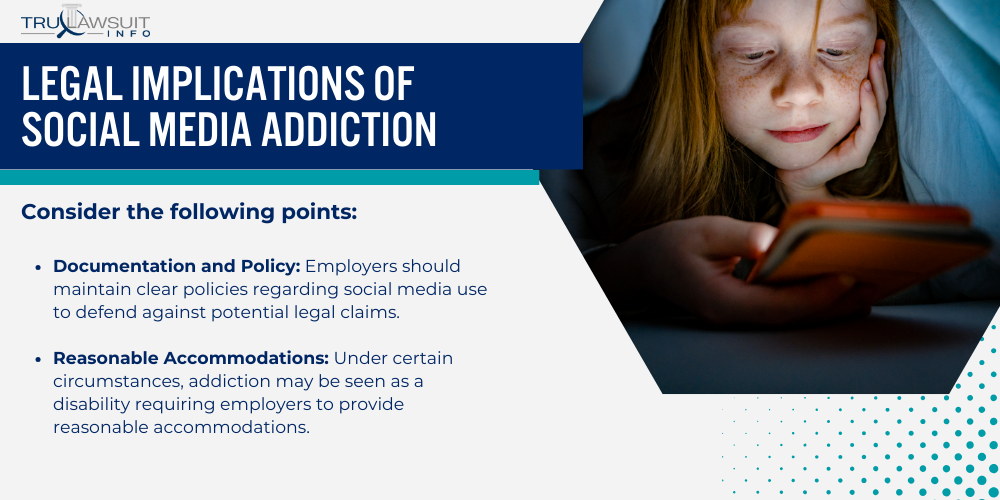
Potential Liability for Employers
Employers might be held accountable if an employee’s social media addiction negatively impacts job performance or infringes upon workplace policies.
Consider the following points:
- Documentation and Policy: Employers should maintain clear policies regarding social media use to defend against potential legal claims.
- Reasonable Accommodations: Under certain circumstances, addiction may be seen as a disability requiring employers to provide reasonable accommodations.
- Employee Assistance Programs (EAPs): Implementing EAPs may mitigate potential liabilities by providing employees with resources to manage their smartphone addiction.
- Training Programs: Regular training can inform employees about the appropriate use of social media and the importance of balancing online engagement with job duties.
Risks of Confidentiality Breaches and Reputational Damage
When employees excessively use social media, the chances of confidentiality breaches and reputational harm increase for both themselves and their employer.
Important risks include:
- Unauthorized Disclosure: Employees may inadvertently share sensitive information, leading to legal consequences for the employer.
- Intellectual Property: There is a risk of disclosing proprietary information that could compromise a company’s competitive edge or violate intellectual property laws.
- Client Confidentiality: For professions governed by strict confidentiality norms, social media addiction can be particularly problematic regarding client privacy.
- Public Perception: An employee’s inappropriate social media conduct could damage an organization’s reputation and erode public trust.
Societal Costs of Social Media Addiction
Social media addiction not only affects individuals but also has a significant impact on societal structures and interpersonal connections.
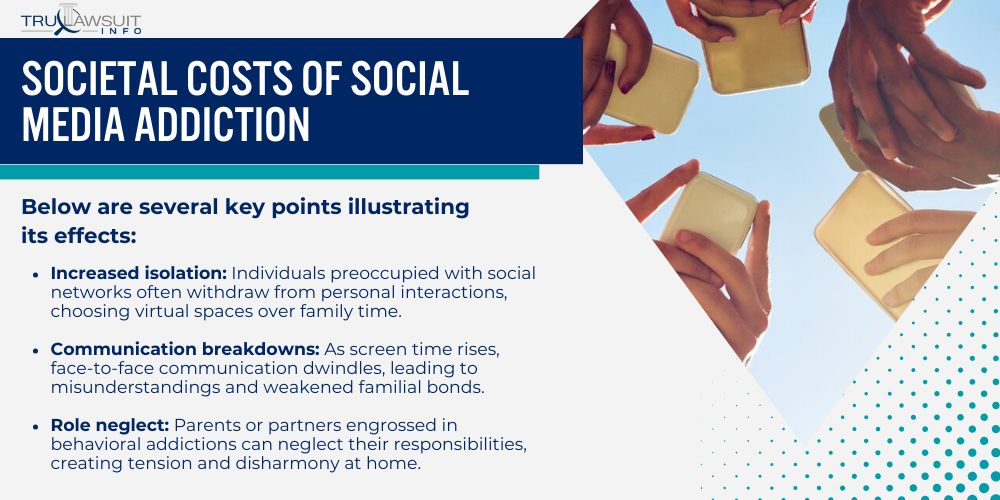
It has distinct ripple effects that extend through families, communities, and social networks.
Strain on Relationships and Family Dynamics
Social media addiction can place considerable strain on personal relationships and family dynamics.
Below are several key points illustrating its effects:
- Increased isolation: Individuals preoccupied with social networks often withdraw from personal interactions, choosing virtual spaces over family time.
- Communication breakdowns: As screen time rises, face-to-face communication dwindles, leading to misunderstandings and weakened familial bonds.
- Role neglect: Parents or partners engrossed in behavioral addictions can neglect their responsibilities, creating tension and disharmony at home.
- Conflict escalation: Excessive use of social media can also be a source of arguments and conflict, further straining relationships.
Reduced Community Engagement and Civic Participation
The extensive use of social media has repercussions on broader community involvement as well.
Here are several impacts to consider:
- Civic Disengagement: When individuals spend more time online, participation in local events and civic duties often suffers.
- Limiting Volunteerism: Communities rely on volunteers, but those absorbed by digital platforms may not contribute to community-driven efforts.
- Impaired Social Skills: Heavy social media use may stunt the development of social skills needed for community interaction and cooperation.
- Neglected Local Issues: With social network’s global reach, local concerns may become overshadowed, lessening community cohesion and response to local needs.
Further research is required to understand and mitigate these effects fully.
Studies should focus on developing effective strategies to promote a balance between online engagement, real-world community, and family life.
Strategies for Mitigating the Economic Impact
Tackling the economic impacts of social media addiction requires proactive steps.
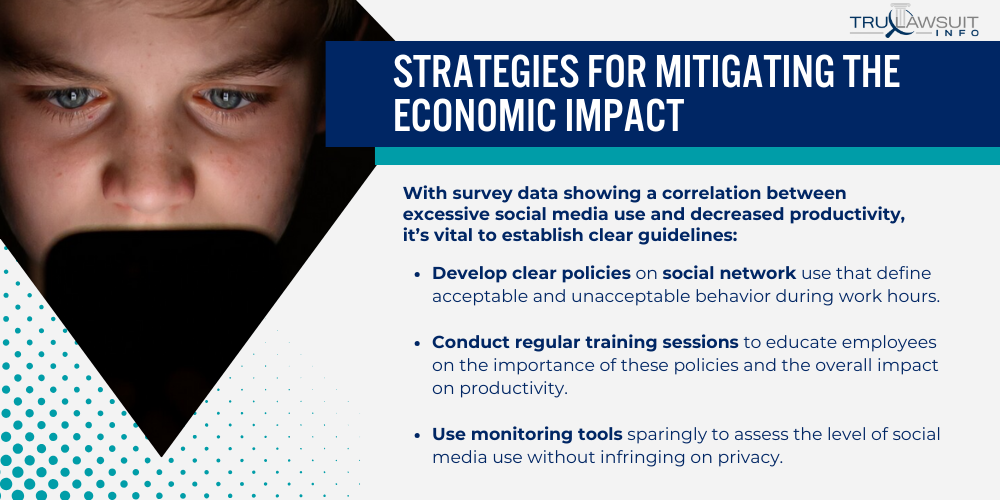
The focus is on two strategic areas: workplace policies and personal digital well-being.
Implementing Social Media Policies in the Workplace
Organizations are becoming increasingly aware of the need to address social media use during work hours.
With survey data showing a correlation between excessive social media use and decreased productivity, it’s vital to establish clear guidelines:
- Develop clear policies on social network use that define acceptable and unacceptable behavior during work hours.
- Conduct regular training sessions to educate employees on the importance of these policies and the overall impact on productivity.
- Use monitoring tools sparingly to assess the level of social media use without infringing on privacy.
- Encourage breaks away from the desk, as short diversions from work can actually improve overall focus and productivity.
Promoting Healthy Social Media Habits and Digital Wellbeing
Individuals, especially university and college students, can be particularly susceptible to social media overuse.
Implementing practices for digital well-being is essential:
- Promote awareness about the signs and risks of social media addiction through educational programs.
- Advocate for dedicated ‘tech-free’ times, helping students develop a balanced relationship with digital devices.
- Encourage self-monitoring of social media use to foster self-awareness and self-regulation.
- Support access to counseling services where students can seek professional advice on managing their digital consumption.
Role of Legal Professionals in Addressing the Issue
Legal professionals play a pivotal role in mitigating the economic impacts of social media addiction.
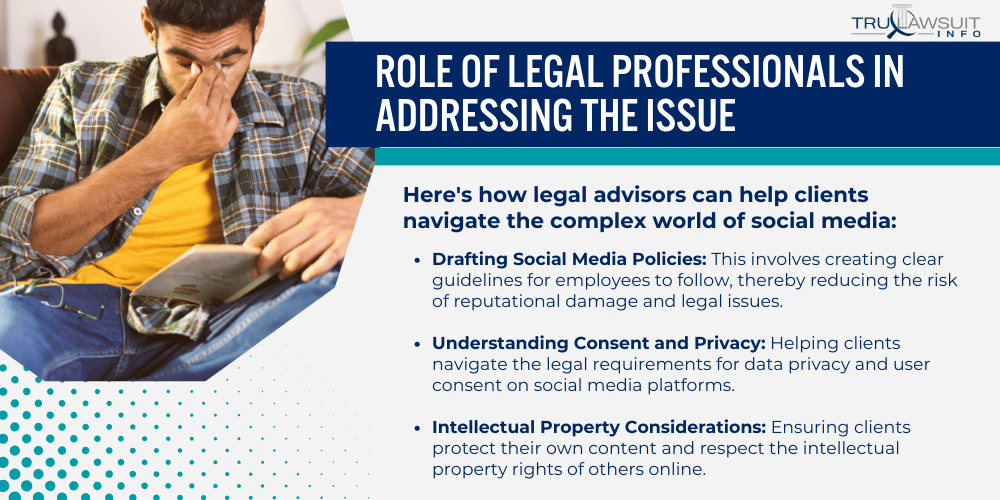
They provide expertise in advising on best practices and advocating for regulatory measures to safeguard affected individuals and broader society.
Advising Clients on Social Media Best Practices
Legal advisors are instrumental in guiding clients through the intricacies of social media usage.
They ensure that individuals and companies understand online behavior’s potential risks and liabilities.
Here’s how legal advisors can help clients navigate the world of social media:
- Drafting Social Media Policies: This involves creating clear guidelines for employees to follow, thereby reducing the risk of reputational damage and legal issues.
- Understanding Consent and Privacy: Helping clients navigate the legal requirements for data privacy and user consent on social media platforms.
- Intellectual Property Considerations: Ensuring clients protect their content and respect the intellectual property rights of others online.
- Addressing Employment Issues: Guiding employers on how to legally approach scenarios involving employees’ social media conduct.
Advocating for Regulations to Protect Vulnerable Populations
The efforts of legal professionals extend beyond individual advisement.
They also encompass the defense of susceptible groups from the adverse effects of social media addiction.
To combat these issues effectively, legal experts are engaged in several key initiatives:
- Pushing for Transparent Disclosure: Advocating for platforms to disclose how they use data clearly. This is particularly important in targeting and retaining internet users.
- Promoting Responsible Advertising: Lobbying for restrictions on ads that exploit addictive behaviors, especially among minors.
- Urging Age Verification Measures: Supporting the implementation of robust age verification systems to prevent underage access to potentially harmful content.
- Leveraging Behavioral Sciences: Collaborating with behavioral scientists to form evidence-based regulations that address internet gaming disorder and other addiction concerns.
Legal experts often reference numerous studies and current research within the behavioral sciences field in addressing the economic cost of social media addiction.
Although general problematic Internet use is not recognized as a psychiatric disorder, the most recent Diagnostic and Statistical Manual of Mental Disorders included Internet Gaming Disorder.
These resources inform their strategies for promoting healthier digital environments.
Balancing the Benefits and Drawbacks of Social Media
The relationship between individuals and social media involves an intricate balance.
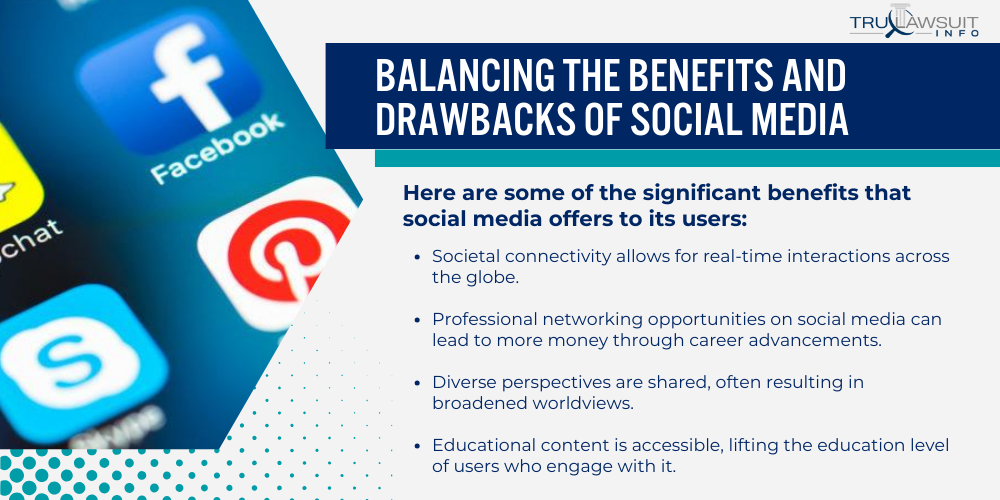
While social connectivity can offer substantial benefits, there are also significant drawbacks linked to addictive behaviors.
Recognizing the Positive Aspects of Social Connectivity
Social media platforms serve as powerful tools for direct communication.
They enable users to maintain relationships over distances and foster a sense of belonging among disparate communities.
Studies suggest that when utilized effectively, these platforms can contribute to a person’s social well-being.
Here are some of the significant benefits that social media offers to its users:
- Societal connectivity allows for real-time interactions across the globe.
- Professional networking opportunities on social media can lead to more money through career advancements.
- Diverse perspectives are shared, often resulting in broadened worldviews.
- Educational content is accessible, lifting the education level of users who engage with it.
Educational content on social media, shared through various posts and articles, has been shown to expand knowledge and provide learning opportunities outside of traditional environments.
Encouraging Responsible Use and Moderation
Limiting the negative effects of social media is essential, as excessive use can lead to detrimental outcomes, including the potential for addiction.
Encouraging moderation and cultivating self-awareness can help individuals use these platforms beneficially.
Here are several effective approaches to fostering responsible social media use:
- Open dialogue about the negative effects of excessive use is necessary.
- Time-management strategies can prevent the loss of productivity due to prolonged browsing.
- Self-regulation tools offered by social media platforms can aid users in monitoring their usage.
- Support networks can be established to assist individuals showing addictive behaviors.
By fostering responsible use and promoting awareness of personal habits, individuals can enjoy the benefits of social media without falling into patterns of overuse that amplify the economic cost of social media addiction.
Future Outlook on the Economic Cost of Social Media Addiction
As society grapples with the rise of the economic cost of social media addiction, the implications for individuals and the broader society are increasingly coming into focus.
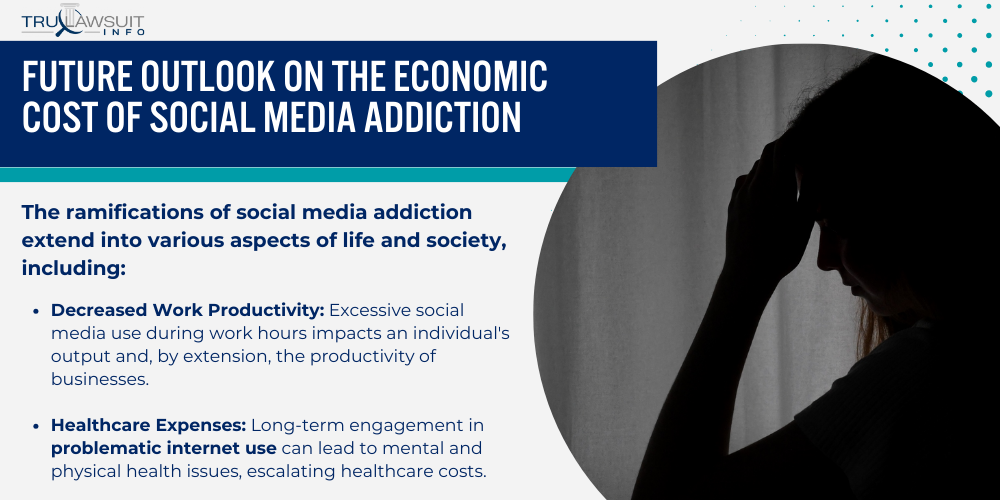
This social media addiction carries significant costs.
Potential Long-Term Consequences for Individuals and Society
Social media addiction has been linked to diminished productivity.
This is because individuals spend excessive time on platforms instead of engaging in economically productive activities.
For young people, in particular, there is a concern that addiction to social media and playing online games can interfere with educational outcomes and job preparedness.
The ramifications of social media addiction extend into various aspects of life and society, including:
- Decreased Work Productivity: Excessive social media use during work hours impacts an individual’s output and, by extension, the productivity of businesses.
- Healthcare Expenses: Long-term engagement in problematic internet use can lead to mental and physical health issues, escalating healthcare costs.
- Educational Impact: The pervasiveness of mobile devices and online games among young people could negatively impact their academic performance and future earning potential.
- Social Costs: Beyond economics, there’s a societal cost in terms of reduced face-to-face interactions and the potential erosion of community bonds.
Need for Ongoing Research and Policy Interventions
With the economic ramifications of internet addiction taking shape, policymakers are looking at targeted interventions to mitigate the negative outcomes.
Key areas of focus for ongoing research and policy development include:
- Regulation of Targeted Ads: Stricter regulations may be needed for targeted ads that may contribute to addiction and excessive use of social media, particularly among young people.
- Supportive Resources: Providing resources and support systems to help those struggling with social media and online gaming addictions.
- Meta-Analysis of Economic Impact: Conducting comprehensive meta-analyses to understand the full economic burden of social media addiction.
- Preventive Education: Investing in education to promote a balanced use of mobile devices and awareness of the risks associated with excessive online activity.
TruLawsuit Info: #1 Social Media Lawsuit Attorneys
In the landscape of social media litigation, certain legal teams have positioned themselves at the forefront.
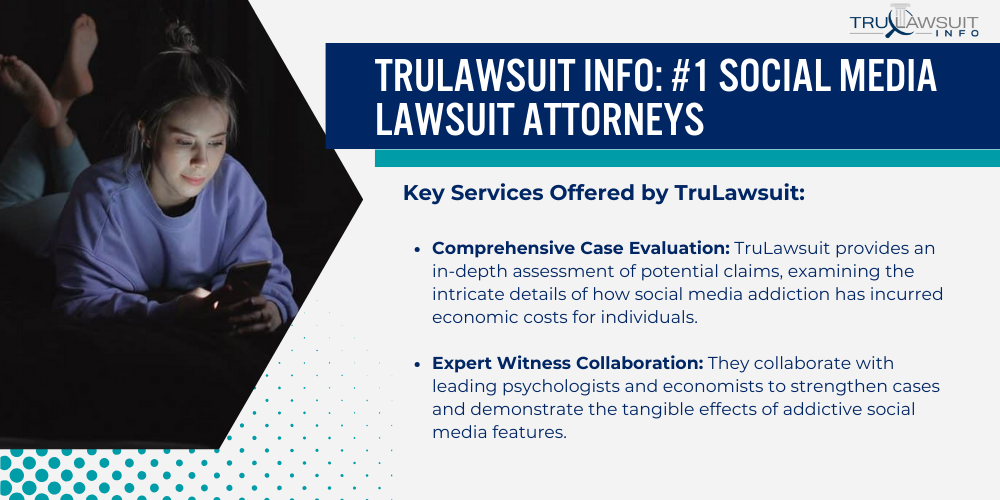
TruLawsuit stands out for its expertise in handling social media addiction cases.
Their attorneys are known for their methodical approach to tackling the economic costs associated with social media dependency and the psychological impact it has on users.
Key Services Offered by TruLawsuit:
- Comprehensive Case Evaluation: TruLawsuit provides an in-depth assessment of potential claims, examining the intricate details of how social media addiction has incurred economic costs for individuals.
- Expert Witness Collaboration: They collaborate with leading psychologists and economists to strengthen cases and demonstrate the tangible effects of addictive social media features.
- Strategic Class Action Lawsuits: They are equipped to lead large-scale class action suits, particularly against major platforms involved in allegations such as those documented by a coalition of attorneys general.
- Litigation for Individual Damages: Beyond class actions, TruLawsuit also represents individuals who have suffered specific economic losses due to social media addiction.
Experience and Successes:
Their attorneys have participated in significant lawsuits, including actions related to protectiveness against platforms designed to maximize usage.
Clients often highlight the team’s detailed knowledge of social media mechanisms that contribute to addiction and the resulting economic impact.
Frequently Asked Questions
-
What are the economic implications for individuals suffering from social media addiction?
Individuals with social media addiction may face personal financial consequences such as decreased productivity and potential job loss.
They often incur increased expenses due to impulsive online spending triggered by targeted advertising.
-
How does excessive social media use impact workplace productivity?
When employees spend significant time on social media, workplace productivity suffers.
This can lead to missed deadlines, poor job performance, and, ultimately, financial losses for businesses due to decreased output and efficiency.
-
What are the broader economic consequences of increased social media addiction in society?
Social media addiction contributes to a broader economic burden on society, including healthcare costs for mental health issues, reduced workforce productivity, and potential disruption of the social fabric that underpins economic stability.
-
How can businesses quantify the cost of employee social media addiction?
Businesses can calculate the cost of social media addiction by analyzing lost labor time, measuring reduced output, and a systematic review of the rate of errors or accidents that correlate with excessive social media use during work hours.
-
What strategies are effective in mitigating the economic costs associated with social media addiction?
To reduce the economic cost of social media addiction, businesses implement strategies such as establishing clear usage policies, investing in employee training on digital wellness, monitoring usage patterns, and encouraging breaks away from digital devices.
-
In what ways does social media addiction affect consumer spending habits?
Social media addiction can alter consumer spending.
This leads to impulsive purchases influenced by social media advertising and the desire to keep up with perceived social norms and trends.
As a result, individual financial stability can be affected.

Experienced Attorney & Legal SaaS CEO
With over 25 years of legal experience, Jessie is an Illinois lawyer, a CPA, and a mother of three. She spent the first decade of her career working as an international tax attorney at Deloitte.
In 2009, Jessie co-founded her own law firm with her husband – which has scaled to over 30 employees since its conception.
In 2016, Jessie founded TruLaw, which allows her to collaborate with attorneys and legal experts across the United States on a daily basis. This hypervaluable network of experts is what enables her to share reliable legal information with her readers!
Have A Case?
Here, at Tru Lawsuit Info, we’re committed to helping victims get the justice they deserve.
To do this, we actively work to connect them with attorneys who are experts in litigating cases similar to theirs.
Would you like our help?
Tru Lawsuit Info is a reliable source of information about issues that may affect your health and safety, such as faulty products, data breaches, and environmental hazards.
Our team of experienced writers collaborates with medical professionals, lawyers, and advocates to produce informative articles, guides, and other resources that raise awareness of these topics.
Our thorough research provides consumers with access to reliable information and updates on lawsuits happening around the country. We also can connect consumers with attorneys if they need assistance.
Camp Lejeune's water contamination issue spanned several decades starting in the 1950s. Exposure to these chemicals has been linked to various serious health issues, including cancer, organ diseases, and death.
Research is increasingly suggesting a link between the use of Tylenol during pregnancy and the development of neurodevelopmental disorders, such as autism and ADHD, in infants.
Legal action is being taken against manufacturers of Aqueous Film-Forming Foam (AFFF), a chemical used in fighting fires. The plaintiffs allege that exposure to the foam caused health issues such as cancer, organ damage, and birth and fertility issues.
Have A Case?
Here, at Tru Lawsuit Info, we’re committed to helping victims get the justice they deserve.
To do this, we actively work to connect them with attorneys who are experts in litigating cases similar to theirs.
Would you like our help?







